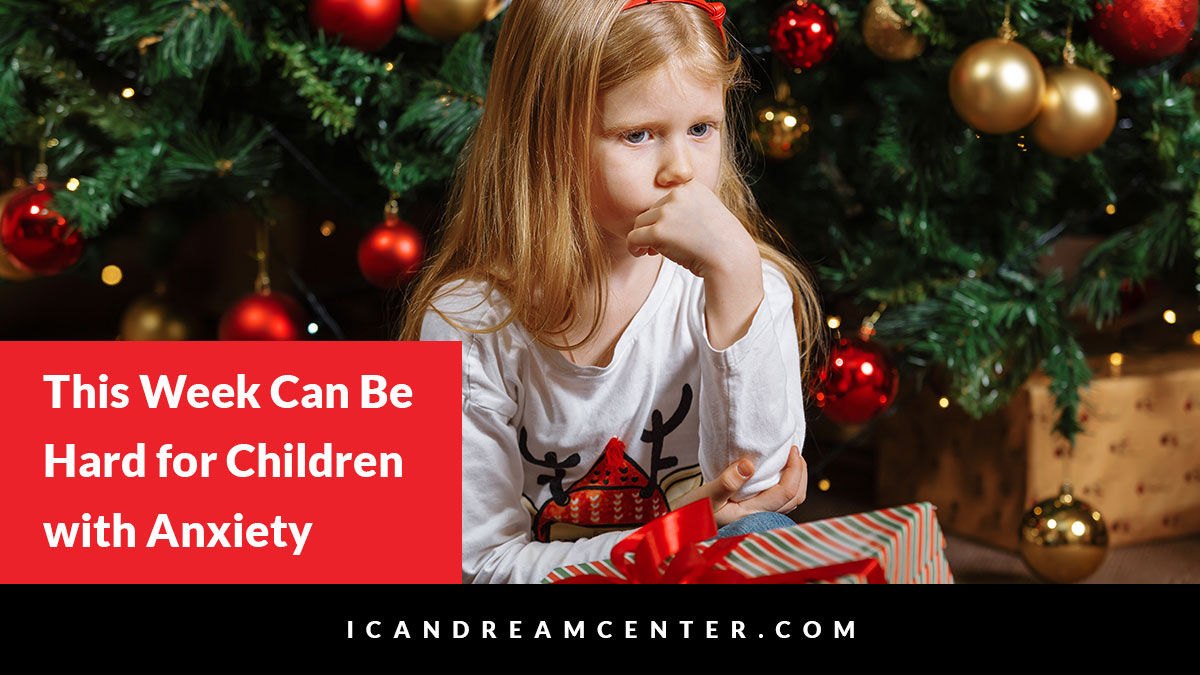
This Week Can Be Hard for Children with Anxiety: Some Ways to Ease Into the Joy
The holiday break is just about here, and along with it, plenty of colorful decorations, gifts, foods, and activities that most kids find exciting in December. However, children with anxiety or sensory processing issues may find the holidays challenging. They may look forward to the season, only to be disappointed when they find themselves overwhelmed with the rush of the holidays. How can parents help children cope so that everyone in the family can enjoy the celebration?
First, it is helpful to remember that many children need a daily routine to feel safe and secure. Holiday activities can disrupt the daily routine and can evoke feelings of anxiety and lack of control. Letting kids know what to expect in advance can help. One way to start, our social workers advise, is keeping the child’s regular bedtime consistent whenever possible.
Next, to cope with potential sensory overload during holiday gatherings, we also suggest preparing an “escape route” for your child, such as headphones and a table in a quiet room, to provide the option to take a break from noisy gatherings. After a few minutes, the child may feel ready to join the group again. Even if that’s not the case, such a retreat can prevent the “meltdowns” that sensory overload can cause.
For some parents, the biggest challenge having an anxious child during the holidays is the food. “We always bring what we know she will eat, and her go-to snacks, says a mom in our parent support group. “She often feels pressured to try something her relatives make, which causes her more stress, so we offer her reassurance by letting her know it’s okay if she doesn’t eat what is offered.”
Our social work team also has a tip for maximizing fun when taking a child to visit relatives and interacting with cousins or friends: careful planning. Having games kids can play successfully with very little to no help from parents allows children to interact with cousins and other children the family does not ordinarily see from day to day without feeling babied. It truly boils down to planning and prepping. We can’t foresee every issue, but we can plan. Prep children before you leave, while en route, when you arrive at the party, and make sure to check on the child throughout the visit.
Telling relatives and friends in advance about your child’s anxieties surrounding new foods, noisy gatherings and/or new situations is important. We suggest making sure your relatives are aware of triggers and behaviors that could occur.
Parents of children who don’t have sensory issues or anxiety may need an explanation as to why pressuring your child to eat certain things or play certain games will not help. Friends and relatives need to be prepared not to be offended if your child isn’t able to try every food offered, for example, or participate in every activity.
Ways to Help Anxious Children Enjoy the Holidays
1. Let kids know in advance what will be happening and explain ways they can opt out or take a break if necessary.
2. Listen to kids’ concerns in advance and offer choices when possible.
3. Provide familiar foods, even when traveling or visiting others for dinner or treats.
4. Make friends and family aware of possible triggers and reactions that could occur. Other adults may try to treat triggered behaviors as discipline problems if they are unaware of the child’s anxiety.
5. Maintain routines as consistently as possible, especially at bedtime. Be prepared to leave gatherings early when needed.
Most important, be flexible, and manage your own expectations for the holiday. With family support, ample preparation, and options for taking breaks, children with anxiety can enjoy holiday festivities more. Our best advice is don’t have your heart set on a `perfect day,’ and be prepared to ride the waves. For some, that looks like being prepared to stay home if needed, being prepared to leave early if the crowd becomes overwhelming. A child’s mental stability comes before the holiday festivities.
